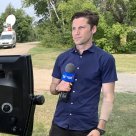More than 700 people have been evacuated from two Saskatchewan First Nations due to wildfires north of Hudson Bay.

Red Earth Cree Nation and Shoal Lake Cree Nation are also calling on the province for more assistance to protect their ancestral land from the wildfires.
During a press conference on Tuesday, the chiefs of both First Nations said the Saskatchewan Public Safety Agency had given them a helicopter tour of the area.
“We saw and witnessed that there’s nobody, absolutely nobody, no machinery, no crews, no air crafts, no air tankers,” said Shoal Lake Chief Marcel Head.
“There’s something wrong, something obviously wrong with that picture.”
Red Earth Chief Fabian Head compared the response to the forest fires earlier in the year.
“We could see the amount of resources that were available and sent there immediately,” he said.
“That’s the type of response we need for our situation as well.”
The SPSA has deployed fire suppression crews and helicopters to battle the wildfires.
- ‘Shock and disbelief’ after Manitoba school trustee’s Indigenous comments
- Canadian man dies during Texas Ironman event. His widow wants answers as to why
- Several baby products have been recalled by Health Canada. Here’s the list
- ‘Sciatica was gone’: hospital performs robot-assisted spinal surgery in Canadian first
In a statement, the SPSA executive director said the agency is responding to 12 wildfires in total right now and several near Red Earth Cree Nation and Shoal Lake Cree Nation.
Chris Clemett said the SPSA is “recalling and redeploying crews from across the province and attacking the fire with tanker, helicopter and ground crews.”
He said the agency deployed four Type 2 fire crews, from the affected First Nations, and hired additional Type 3 crews to battle the fire, along with staff and equipment from the Weyerhauser lumber company.
According to the SPSA website, Type 2 crews are comprised of people from First Nations and northern communities, which consist of five firefighters including the crew leader.
The site states “Type 2 crews provide firefighting and response services, as needed, and work on projects within their home communities in times of low fire danger.”
Type 3 crews are “made up of qualified firefighters hired on an emergency basis” and “ are normally used on a fire line that is under control or in the mop-up stage, or low in complexity and expected fire behaviour.”
The statement said the Chiefs may not have been able to see the firefighting efforts because the fire is so vast and the relatively poor air quality.
“Crews are being redeployed to the head of the fire, which is moving away from the communities at this time, so it’s also possible that the tour did not include that part of the fire,” the statement said, also mentioning the pilot may not have taken the craft near the area seeing aerial response to ensure the safety of the passengers.
It also said the agency is in constant contact with community leaders.
On Tuesday, Red Earth Cree Nation said it evacuated more than 200 members to Regina and Saskatoon.
Shoal Lake Cree Nation evacuated approximately 580 members and residents to Prince Albert on Sept. 30.
Shoal Lake Cree Nation Chief Marcel Head says calling for the evacuation was a last resort.
“But we need to keep the health, wellness, and safety of all our people front and centre,” he said.
“For the second time this summer, we are doing all that we possibly can to assure our people, and to give them some measure of comfort in a stressful situation.”
Both Chiefs said members found the evacuation distressing.
“It really disrupts the family, (the) connectedness, in the community,” Chief Marcel Head said.
Chief Fabian Head said being forced to leave triggered residential school trauma in some elders.
As of Tuesday morning, 13 wildfires were burning in Saskatchewan, eight north of Hudson Bay.
Head said the fires pose a threat to their ancestral lands and resources and their economies depend on a healthy land base.
“We are communities that follow the Cree way of life and we continue to be based on a hunter-gatherer-based economy,” he said.
“If the province does not put more resources into fighting the wildfires, our communities will suffer from its impacts for years to come.”
The SPSA says there have been more than 600 wildfires in Saskatchewan this year – which is more than double the five-year average.
Both Shoal Lake and Red Earth leaders have mobilized response and support measures to fight the wildfires and to secure homes, property and assets in the communities.
Prince Albert Grand Council’s Saskatchewan First Nations Emergency Management, the Canadian Red Cross, along with the federal and provincial emergency response measures agencies and city municipal support systems, are providing support to the evacuees.
Chief Marcel Head urged the government to “get your act together.”
“Put the resources in place and deploy the necessary supports that we do need to put out these fires,” he said.
“If there is any resources out there that we can utilize, we’ll put out the fire ourselves if it comes to that.”






Comments